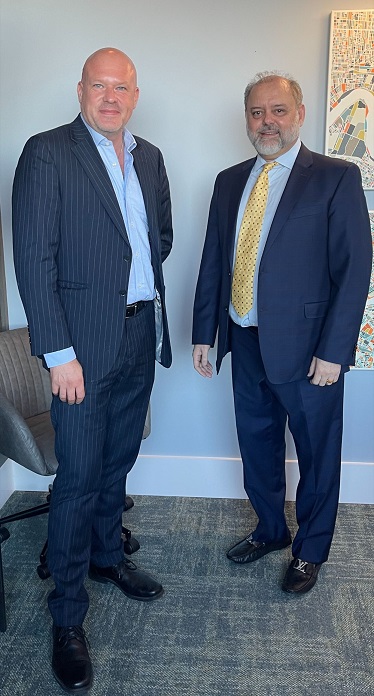with JR Dallas Wealth Management
Today the world of innovation and startups is unimaginable without the support of investors. In this story we are going to focus on one of the many types of investors, namely private equity. Lots of different types of individuals can be found in the private equity space. Former StartUp founders, serial entrepreneurs, financiers, and many others. Key to running an investment business is a strong understanding of finance, and a good knowledge about how banks work. Something that people in private equity have in common. A desire to know the numbers and find the best investment opportunities in the market.
Fortuitously, private equity firms are in abundance in the Dallas-Fort Worth area. Possibly not as many as you might find in New York or San Francisco, but a fair amount, nonetheless. A sector that really gained popularity during the 1980s, it’s also important to distinguish the variance between private equity and venture capital. The difference is minor, except that venture capital usually invests much sooner. Private equity sticks to larger non-listed companies to invest in. And real estate. And some other investments that some might call ‘fixed income’.
Boston Consulting Group in collaboration with iCapital reported earlier this year how private equity funds will continue to grow. They have already grown from $2.4 trillion assets under management in 2015, to $5.3 trillion in 2020.
During the #DisruptionBanking #RoadTrip to the U.S., we were fortunate enough to meet with Jehangir A. Raja, CEO of JR Dallas Wealth Management. He helped explain some of the challenges and opportunities that are in abundance in Texas and the U.S. today.
The Road to Texas
Jehangir used to work on Wall Street. In the 1990s he was an equity trader in New York. He was always interested in sectors that were ‘lagging’. Whilst everyone was trading bonds, he already had one eye on what was then a miniscule sector, private equity.
He came to Texas in the mid-90s after investing into real estate near Dallas. He explained how private equity back then was a little bit like blockchain is today. People knew about it, but the potential hadn’t been realized yet.
Today the portfolio of JR Dallas Wealth Management is worth $1.8 billion. Jehangir has ten portfolio companies and is a well-respected member of the Republican party in North Texas.
“There are a lot of distressed assets because of how interest rates have been rising,” he explained. Drawing comparisons between the World Wars and what is happening today in Europe, he shared how the U.S. always grows after turbulence hits Europe. How now is the ideal time to invest in real estate and cutting-edge technology.

Focus on Technology
We raised the question of valuations with Jehangir. We highlighted how some of the biggest household names in technology have had their valuations hit. Jehangir was quick to point out the difference between private valuations and those that are related to public listed companies. And, where public listed companies may still take a hit as the economic turmoil continues, those not listed have already started to stabilize.
“This is a perfect time for startups. For private equity to acquire startups,” he explained. “That is what we are doing at JR Dallas Wealth Management.” But Jehangir doesn’t mean companies with a small cashflow problem. He is looking at unicorns and established tech firms who have a big balance sheet. “It is a perfect time right now to acquire those companies and bring new capital, fresh money into them. The resilient companies will see a boom for the next two to four years,” he predicted.
Evolving for Success
AOL and Facebook are two examples Jehangir used to explain the outcomes he looks for in companies he invests in. He explained how Facebook may be struggling to evolve into the metaverse, but that AOL simply disappeared due to lack of evolving. AOL’s lack of evolving was its main downfall. Much like Blockbuster Video vs Netflix.
Pointing to the strength of a balance sheet and business resilience, Jehangir highlighted how investment into research and development were key. When investing today, it’s important to look at companies with a good link between technology and digital presence, like firms who focus on artificial intelligence.
One firm that came up was UBER, a company that turned a profit in 2021 for the first time but has gone back to posting losses in 2021. Jehangir agreed that the firm hadn’t evolved enough. “Everybody can do what UBER does,” Jehangir explained, “but where is the competitive advantage?”
“The competitive advantage lies in evolving,” Jehangir highlighted.
Investment Opportunities are not in public markets
UBER, Coinbase, Tesla, and others are all listed on the public markets. However, Jehangir believes that many investors today are weary of the turbulence that has been prevalent on public markets in recent times. That investors are turning more and more to private equity instead.
Liquidity is the key to enticing investors into public equity. Strengthening the secondary market would be a big part of this. Jehangir believes that if secondary markets can become as liquid as the Nasdaq or other exchanges it would be a great time to drive investors towards the opportunities that are available there.
Secondary markets are one aspect of investment. There is also the more conservative stance on how to go about finance in Texas. So we turned next to the banking landscape in Texas and how easy it is for smaller tech firms to gain financing.
The Changing Banking landscape in the U.S.
Naturally, as all companies seek ways to improve cashflow. The role of the community bank in the funding of small businesses came up. Especially as the community banking scene in the U.S. is very diverse. There are hundreds of different banks from the Bank of Austin to the local credit union, to Fifth Third Bank, Comerica, Capstar, the list is endless. Some of them are more community focussed and local to a small geographical area. Others are nationwide with a strong presence in their home state like Comerica in the case of Dallas.
The smaller community banks are facing their own challenges, though, Jehangir reminded me. Compliance and growth capital are the two challenges we discussed first. Somehow even small businesses feel safer banking with the larger banks, lowering the working capital the local community bank has to offer. Not to mention the increasing cost of compliance.
Adding to this is the increasing need to protect your business against cyber-attacks. At the same time as competing with a new breed of digital bank. Jehangir believes that the larger banks will be able to evolve more efficiently. If nothing is done to stabilize the situation for smaller community banks, then this will lead to consolidation in the market.
Larger Banks are well prepared for a Downturn
Jehangir has first-hand experience to some of the events that shook Wall Street during the economic crisis in 2007-8. He believes that banks are all well capitalised today, mainly due to the stress tests carried out since the early days of the Frank-Dodd initiatives.
Since due diligence has been more rigorously enforced by banks than ever before (think FATCA for example), it has been easier for banks to say ‘no’. Today banks have more credible buyers / customers than ever before. Putting them in a very comfortable situation, Jehangir explained.
He pointed to how today the higher equity stake that mortgage holders have in their properties makes assets like repossessed homes and businesses easier to sell ‘off market’ to asset managers or private equity, for instance. Before, when there was sometimes less than 10% equity held by the owner in a property, it was simply harder for a bank to make any return. In fact, Jehangir pointed out, there have been no bank runs or closures of any note since 2008. Pointing out how this shows how much better the situation for banks today is.
At the same time this hasn’t necessarily meant an increase in financing options for smaller tech firms. In fact, financing from your local bank is filled with hoops that many small entrepreneurs struggle with.
Texas – the Decentralized State

Regulation is light in Texas. But investment opportunities don’t appear to abound in the city like you would hear about in California. Jehangir is not worried about this though. He believes that with the digital economy there will be a need for lots of space. For data centers, for cloud services or other infrastructure needs. Things that in Europe are limited by available space.
Leading to his most important message.
“This is the right time to invest in Texas. Texas has the best of both worlds. It’s got the money like New York, and it’s got the technology and space like California,” Jehangir highlighted.
He went on to explain how investment is a relationship-based business. If you don’t know your money manager, then you won’t invest with her / him. Texas simply needs to get to know the abundance of investment opportunities that lie in the Lone Star State. And take advantage of them. Much like community banking will have to evolve in the near future, there is a hope that investors from Texas will also look for a better and reliable base of private firms to invest in. Firms sometimes located down the road. And not all the way on the East or West coasts.
Author: Andy Samu
#PrivateEquity #Banking #Investment #SecondaryMarkets #Texas #StartUps #Technology #ArtificialIntelligence #Evolve #CommunityBanking















